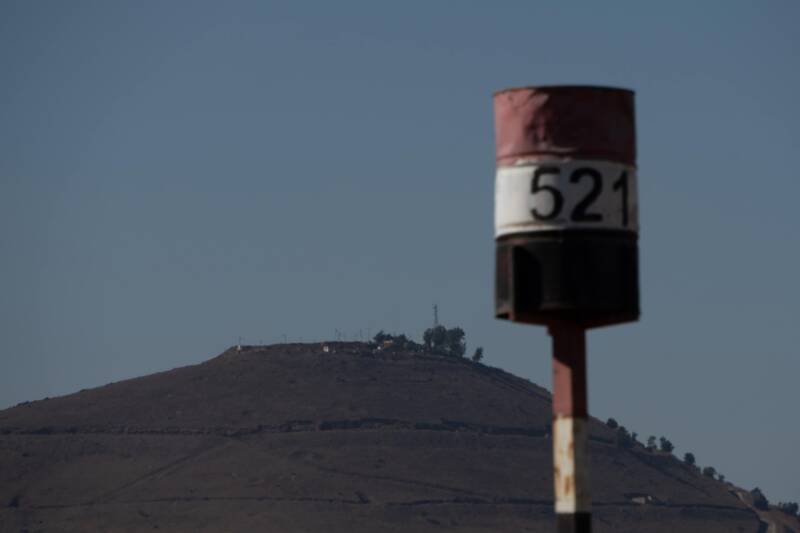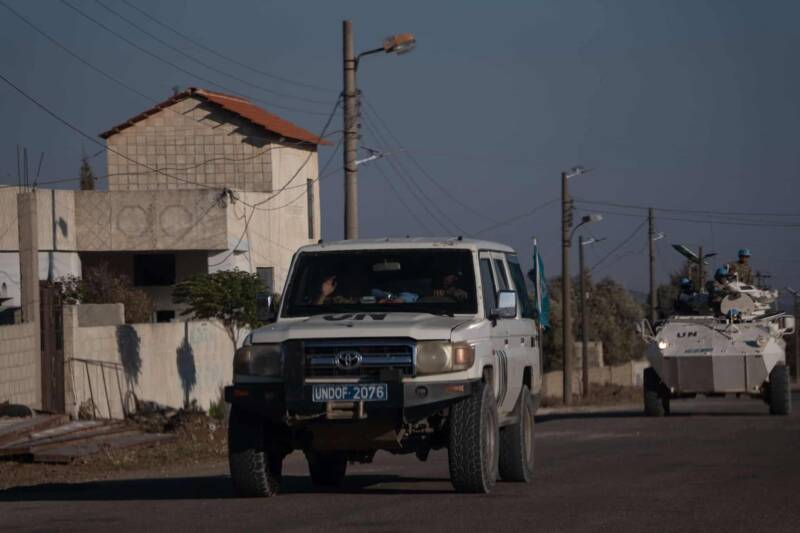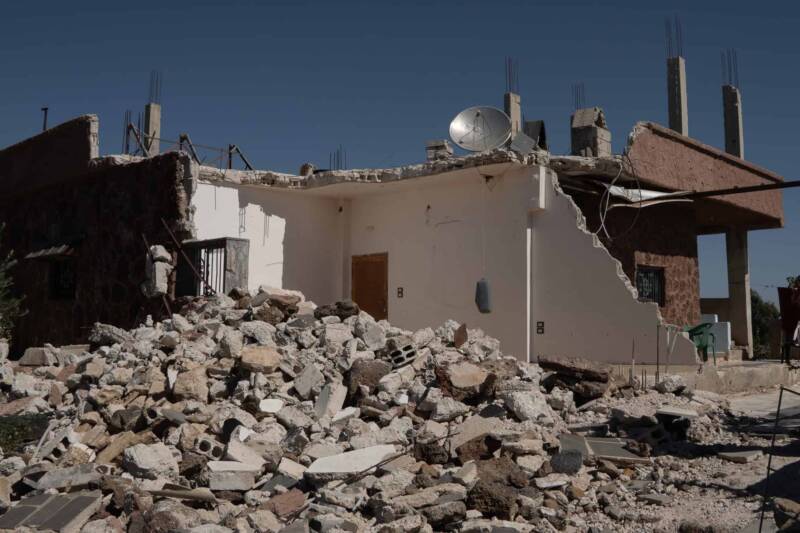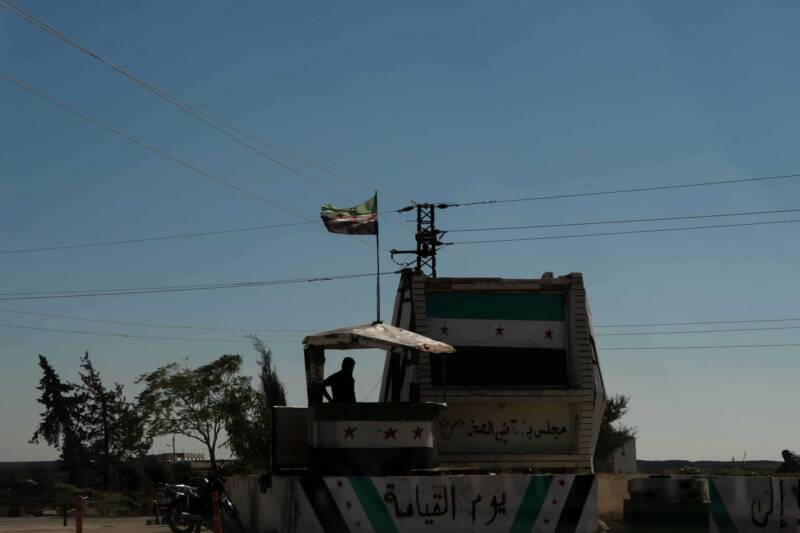QUNEITRA — It was two o’clock in the morning of September 16 when Muhammad Hussein Arabi, 48, woke to the din of sound bombs near his house in Khan Arnabeh, a small town in Syria’s southwestern Quneitra province. Looking around in confusion, he realized that his home was surrounded.
A voice in Arabic rang out over a megaphone: “Suheil Arabi, surrender yourself.” The men outside—Israeli soldiers—were asking for his 17-year-old son.
Soon, the soldiers were at his doorstep, demanding to see Suheil and telling Muhammad—who goes by Abu Suheil—to give up any weapons in the house. Abu Suheil says they conducted multiple searches inside, including with sniffer dogs and drones.
“I told them I didn’t have any weapons,” Abu Suheil said. “I didn’t know where Suheil was either, I was sleeping.”
Earlier that night, the Arabi family—Suheil is the only son—had returned from a picnic. Abu Suheil felt tired and went to sleep, he said. When he woke up to the chaos, he realized that his son had already fled. Suheil’s mate was still hot in the living room.
“He’s a child, he’s just 17,” Abu Suheil said. “He must have gotten scared of all the noise and run off.”
Abu Suheil says his son had never had run-ins with authorities—Syrian or otherwise—before. The closest he came to trouble was a minor motorcycle accident a few months earlier with a United Nations (UN) patrol in the buffer zone running between Khan Arnabeh and the Israeli-occupied Golan Heights.
Most recently, after seeing the new Syrian army was looking for recruits, Suheil signed up with some friends in the hope of earning some money, his father said. At the time of the September raid, he was yet to receive his training or to be formally registered.
After searching the Arabi family’s home, the Israeli soldiers blindfolded Abu Suheil, put him in handcuffs and drove him to their base near al-Hamidiyeh village, about 15 minutes away by car. They kept him there for over 24 hours, questioning him about his son’s whereabouts.
“It was the first time they entered Khan Arnabeh,” Abu Suheil told Syria Direct a month later, puffing on a cigarette in his living room.
A hilltop Israeli outpost built on Syrian territory in Quneitra, with a buffer zone indicator in the foreground, 14/10/2025 (Anagha Subhash Nair/Syria Direct)
The buffer zone
In 1974, Israel and Syria agreed to an uneasy disengagement following years of war as part of a UN-brokered agreement. The deal established a demilitarized buffer zone under the supervision of the United Nations Disengagement Observer Force (UNDOF), whose patrols became a regular part of life in the area.
The buffer zone stood for 50 years. But when the Assad regime fell last December, Israel unilaterally declared the 1974 agreement “void until order was restored,” invaded the strip of territory and established six military bases in Quneitra province.
Nearly a year later, the occupying forces regularly set up flying checkpoints at the entrances of Quneitra villages, and often conduct patrols deeper into Syrian territory. The UNDOF still maintains a presence, often issuing reports about the tensions and violations.
The buffer zone is marked by barrels painted in red and white, placed along the UN-demarcated Alpha line to the west and Bravo line to the east. Numbers on the barrels indicate the distance in meters from the other side of the zone.
Khan Arnabeh, where Abu Suheil lives, sits just east of the Bravo line, the boundary on the Syrian side of the buffer zone. Since the regime fell, Israeli incursions have been common in border villages inside the zone, like Jubata al-Khashab, he noted. Ones further inside Syrian territory, like Khan Arnabeh, had largely escaped, though in early November, a flying checkpoint was installed by the Israeli army not far from the village.
Abu Suheil says he has no clue why the Israeli soldiers came looking for his son. A few days after he was released, Syrian General Security arrived at his house. “They kept me for about half an hour, asking me why the Israelis wanted Suheil,” he explained. He told them he knew nothing, and they left.
A UNDOF patrol in Quneitra, 14/10/2025 (Anagha Subhash Nair/Syria Direct)
Displacement and destruction
Since invading the buffer zone last December, Israeli forces have carried out abuses in southern Syria, including the war crime of forced displacement, Human Rights Watch reported in September. Homes have been seized and demolished, and Syrians have been detained and taken into Israel in violation of international law.
Adam Coogle, deputy director at the Middle East and North Africa(MENA) division of HRW says the Israeli military cites “military necessity” for some of its actions in the south.
“It’s not a very good argument because there weren’t really active hostilities,” he told Syria Direct. “And they didn’t really provide for the population at all, they just kicked them out.”
In October, Israeli forces detained five civilians from southern Quneitra—just one of the latest in a string of incursions and detentions since the regime’s ouster. In August, Israeli forces shot and killed a young man near his home in the northern Quneitra village of Taranja.
Abu Muhammad (a pseudonym), an agricultural worker living in Rasm al-Rawadi, a town located inside the buffer zone less than two kilometers from the Alpha line, is among those whose homes have been destroyed.
He was at home in the early hours after the regime fell on December 8, 2024, when Israeli troops entered his village and forced many villagers out of their homes and into an abandoned house.
“After a few hours, they gave all of us an evacuation warning, and didn’t let us take even the basic necessities from our homes. We were displaced to a neighboring village for about a month and twenty days,” he said.
Abu Muhammad is originally from the occupied Golan Heights, which were seized and occupied by Israel in 1967. He was displaced to Damascus until 1974, when he returned to the country’s south, and set up a new life in Quneitra province. During the Syrian civil war, he was forced to leave his home again in 2014, moving back to Damascus before returning to Quneitra. “Our whole life is one displacement to the next,” he quipped.
When he returned home to Rasm al-Rawadi after the latest round of displacement, Abu Muhammad realized that Israeli forces had demolished part of his home.
Abu Muhammad’s partially demolished house in Rasm al-Rawadi, Quneitra, 14/10/2026 (Anagha Subhash Nair/Syria Direct)
“Why? We don’t know why. They’re an occupying enemy, that’s their name,” he said with a shrug, standing with his back to the skeleton of what was once his living room. Nearby, two other houses were also partially demolished by Israeli forces.
Israeli forces still conduct regular patrols in his village, maneuvering through its wide expanses of farmland. Throughout what was once a buffer zone, roads are dotted with earthen barriers set up by occupation forces, forcing residents to take long, convoluted routes while traveling by car. Often, villagers are forced to interact with patrols on the roads.
“They behave badly with us, they always talk to us in a condescending way, and sometimes even hit [us],” Abu Muhammad said. “They bother us; if you tell them you’re trying to go home, they tell you you can’t and ask you to leave.”
‘To disrupt any momentum’
Caroline Rose, director of the New Lines Institute, a Washington-based think tank, says Israel’s justification for unilaterally nullifying the 1974 agreement is “intentionally vague.”
“This is really a breakout opportunity for the Israeli government to try and establish a buffer zone that they’ve long sought all along,” she explained—one that it controls.
“It’s also a way to disrupt any momentum that the new administration has, and prevent it from being able to acquire any sort of conventional military equipment or capabilities,” she added.
In August, an Israeli airstrike targeted the new authorities’ Internal Security Forces (General Security) headquarters in Quneitra’s al-Salam city. Tel Aviv has repeatedly called for the complete demilitarization of southern Syria.
Syria Direct contacted the Internal Security Forces headquarters in Quneitra, which said it could not comment.
In late October, Syria’s Permanent Representative to the UN Ibrahim Olabi called on Israel to withdraw its forces from southern Syria, including from the occupied Golan Heights, condemning the country’s actions as undermining Syria’s “security and stability.”
An Internal Security Forces (General Security) checkpoint in Syria’s southwestern Quneitra province, 14/10/2025 (Anagha Subhash Nair/Syria Direct)
In some cases, the Israeli army has justified abductions of Syrians with allegations they belong to Iran-backed groups, Hezbollah or Hamas—claims Rose is skeptical of. In the early years of the war in Syria, Iran had a presence in Quneitra through its armed proxies. By 2018, however, an Israeli-Russian agreement largely kept Iran and allied groups at bay, though their presence had not been completely eliminated.
“At this point, so many of these networks are trying to lay low rather than create justification for recurrent Israeli strikes,” Rose said. “It’s very clear now no one is safe in the more traditional parts of Hezbollah control and influence in Lebanon, so I really doubt that this contested area would be seen as a safe haven for these different networks.”
‘Living under occupation’
For Abu Muhammad, the experience of repeated Israeli incursions into his hometown has been one of “humiliation.”
“I feel like I’m living under occupation. They don’t let us farm. They destroyed all our trees in the area, which were hundreds of years old, with their bulldozers,” he said. “They destroyed our lands, roads, water supply and electricity.”
Israel and Damascus have been engaged in diplomatic discussions in recent months, with the latter hoping for a return to some version of the 1974 agreement. The latest round of talks hit a speedbump with Israel’s demand to open a humanitarian corridor to Suwayda, where fighting between local Druze and Bedouin fighters spiraled into sectarian massacres in July, with the participation of some Syrian government forces.
“We could take lessons and try to replicate some elements [of the 2018 agreement] in a UN-brokered, UN-controlled process along Syria’s border region,” Rose said. “I think that really is the only way, because if we expect the government to implement this, then we could see clashes once again between Druze and Sunni elements.”
The Israeli-Russian agreement of 2018 saw Syrian government troops deployed along the southern border of Syria, contingent on Iran and its allies staying away from the border region. Rose believes that with key players including Turkey, the United States and Russia having regional interests, and internal tensions in Syria, UN control is necessary for a security agreement along the country’s southern border.
Abu Suheil, meanwhile, continues waiting for his son to return home. He says he has not heard from him since the night Israeli forces raided their home in September.
“I’m worried about my son, I hope he isn’t on the wrong path as I’m far from him,” Abu Suheil said. His left forearm bears the tattoo “Abu Suheil,” which he shows with pride. He chose the name Suheil 30 years ago for his firstborn son, long before he married.
“I’m really not doing okay,” he said. “I want to find him.”






